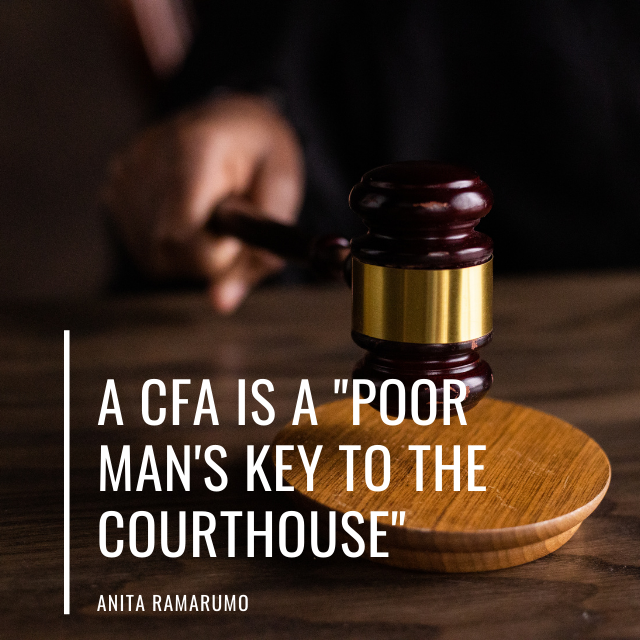Authors – Anita Ramarumo & Zunaid M Lundell
A Contingency Fee Agreement (CFA) is an agreement entered into between a legal practitioner and a client in terms of the Contingency Fee Act No. 66 of 1997 (the CF Act) whereby the legal practitioner shall not be entitled to any fees for services rendered unless the client is successful in the relevant matter. The Act was promulgated to facilitate access to court, which is a fundamental right enshrined by section 34 of the Bill of Rights of our Constitution. This is especially true for the large number of people in our country who cannot afford the considerable costs of legal services.
Section 9(1) of the Bill of Rights states that:
“Everyone is equal before the law and has a right to equal protection and benefit of the law”.
In addition, Section 34, outlines that everyone has the right to access to courts. This Section states that:
“Everyone has the right to have any dispute that can be resolved by the application of law decided in a fair public hearing before the court or, where appropriate, another independent and impartial Tribunal or Forum.”
As a legal practitioner, one must be sensitised to the context in which law is practiced and the egregious income disparity that exists ins South Africa, between those who are able to afford quality legal services and those who are not. It is also important to understand that under sections 9 and 34 of the Constitution, everyone has the right to equal protection and benefit of the law, including those who otherwise would not be able to afford legal services.
Each member of South Africa’s society therefore has an equal right to adequate legal representation and access to justice. The CF Act gives effect to these rights as set out in the Bill of Rights and should therefore be seen as a key to justice for the poor person. The CFA acts as an imperative contractual tool which prospective clients of legal practitioners may agree to based on its terms, which are ultimately bridled and regulated by the CF Act.
For example, the majority of injured people in motor vehicle accidents enter into Contingency Fee Agreements with legal practitioners with respect to their damages claims against the Road Accident Fund (RAF). This provides people who are left destitute after traumatic and often debilitating accidents with legal recourse against the wrongdoer’s insurer being the RAF. Such recourse in the normal scope of hourly legal fees is just not an option for average person in South Africa.
THE IMPORTANCE OF A “NO WIN, NO FEE” STRUCTURE
The ‘No win, No fee’ contractual structure is ideal for the client that is financially constrained, as it ensures that the legal practitioner dealing with a client’s matter applies her mind, litigation abilities, skill-sets, confidence and commitment to the matter at hand. .
The attorney takes a calculated risk of financing the client’s matter in anticipation of their being a successful outcome, which is directly related to several variances, chief of which would be the attorneys’ skill, drive and commitment to her client’s matter.
The Act was enacted to regulate contingency fee agreements which were being consummated between clients and legal practitioners. It further sought to mitigate “overreaching” which some legal practitioners fell afoul of. Often there is a lack of clarity surrounding legal costs and how they operate and because of this, legal practitioners have the legal responsibility to be transparent with their clients regarding the terms of a contingency fee agreement.
Section 2(1)(a) of the CF Act provides that a legal practitioner shall not be entitled to any fees for services rendered unless the client whom she represents is successful in the proceedings or matter in question. Further, section 2(1)(b) read with section 2(2) requires that a legal practitioner’s success fee may be inflated by not more than 100% her normal fee and that the total success fee payable to the legal practitioner shall not exceed 25% of the total amount awarded. Thus the success fee must be the lesser of 100% of the legal practitioner’s success fee or 25% of the monetary award in the relevant matter, whichever is the lesser..
In the matter of Mfengwana v Road Accident Fund 2017(5) SA 445 (ECG); it was held that the impugned contingency fee agreement appeared to be in conflict with the CF Act. This draws back to the important role that the CF Act plays in regulating the terms of a contingency fee structure between the client and attorney. .
CONCLUSION
In conclusion, those without means to afford attorney fees in order to seek justice may look to a contingency fee structure should a legal practitioner be willing to proceed on risk. A contingency fee agreement is not merely an agreement between an attorney and client but an optimal compensation scheme for both the attorney and the client, as well as a key to justice for the poor person. This means that it is an ideal tool that gives the poor person an opportunity to have access to justice, to be heard and to be compensated. In our Constitutional democracy the costs of legal services should be held neither as a bar nor as an obstacle to accessing justice, rather, the legal fraternity should look to novel methodologies to provide our services to those who cannot otherwise afford such legal services. The contingency fee route, described above, provides such an avenue – one which caters to the disparities which remain embedded in the fabric our Country.
